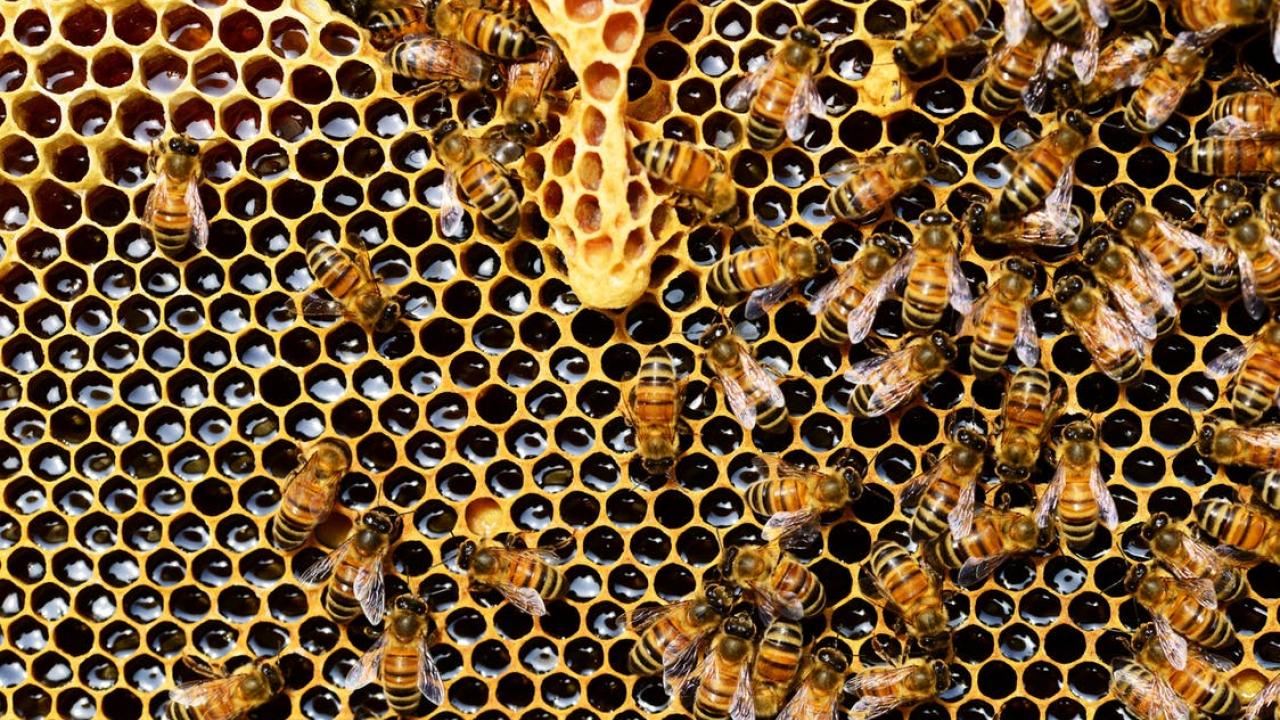
Honey: Intrinsically Non-GMO
by Amina Harris, Director, Honey and Pollination Center, UC Davis
(with input from Kent Bradford, Interim Faculty Director, World Food Center)
Questions have been raised with respect to whether honey produced by bees that might visit genetically modified crop plants should also be considered to be GMO. First, what is a “GMO”?
Defining the term “Genetically Modified Organism” (GMO):
- United States Department of Agriculture: The genetic modification of organisms by recombinant (recombining genetic material)[1] DNA techniques.
- World Health Organization: GMOs can be defined as organisms (i.e. plants, animals or microorganisms) in which the genetic material (DNA) has been altered in a way that does not occur naturally by mating and/or natural recombination.[2]
- Non-GMO Project: A GMO is a plant, animal, or other organism whose genetic makeup has been modified in a laboratory. This creates combinations of genes that do not occur in nature or through traditional crossbreeding methods.[3]
These definitions could potentially encompass most foods, but in fact only a few GMO crops have been commercialized (primarily maize, soybean, canola, cotton, and papaya). There are several foods that are not able to be genetically modified, yet we see labels that indicate they are ‘non-GMO’. Essentially, if a food does not have genes – doesn’t come from an organism – it can’t be genetically modified. This includes water, salt and honey! These foods, and others like them, cannot be GMO and should be exempt from any non-GMO certification process.
Honey in its natural state is a non-GMO food, because:
- Honey bees are not genetically modified.
- Honey is produced from the nectar of plants, and is not exposed to artificial manipulation in a laboratory.
- Pollen grains are the only component of honey in which genetically modified proteins might be found. However, the amount of pollen in honey, which ranges from 0.1% to 0.4%, averages about 0.2%. Even in countries that require GMO labeling, the potential percentage of GMO content that could be present in honey falls well below the standard legal threshold of 0.9%
GMO foods in other countries:
- The European Union, Australia, and other countries have established thresholds for labeling laws relating to GMOs. These regulations state that foods containing above 0.9% GMO must declare that GMO content on the label.
- Any GMO presence in honey never exceeds the 0.9% legal threshold. Thus, these countries do not require honey to be identified or labeled as “non-GMO.” Both the consumers and the governments of those countries recognize honey as being an intrinsically non-GMO food.
GMO foods in the United States:
- At present there are no GMO labeling requirements in the United States. The state of Vermont had enacted legislation in 2016 requiring GMO labels, but this was superseded by federal labeling legislation that is scheduled to take effect in July 2018. This legislation clearly excluded foods from the requirement when the food is “consisting of or derived entirely from an animal that is itself not produced with genetic engineering, regardless of whether the animal has been fed or injected with any food, drug, or other substance produced with genetic engineering.” Since honey bees are not GMO and they produce honey, the honey itself should not be labeled as GMO regardless of the plants visited by the bees.
- The FDA discourages the use of the term “GMO Free” because all food items may contain trace amounts of GMOs.
References:
- Report: Impact of the European Court of Justice Ruling on the Honey Directive and Relevant Existing Legislation; September, 2013:
- Report: Labeling Food Processes: The Good, the Bad and the Ugly, by Kent D. Messer*, Marco Costanigro, and Harry M. Kaiser
- Document: https://www.nsf.org/newsroom_pdf/FS_NonGMO_Project_Verification_Guidance_Document.pdf Section B – Inputs 4.c
More information:
- Read: Honey’s Not GMO
Bee Culture Magazine; August, 2016: Statement from various packers and organizations as follows: This message is supported by the American Beekeeping Federation, American Honey Producers Association, National Honey Packer & Dealers Association, Sioux Honey Association and the Western States Packers & Dealers Association. As a collective group, these organizations represent approximately 95% of the entire United States Honey Industry.
- Read: GMO Answers
